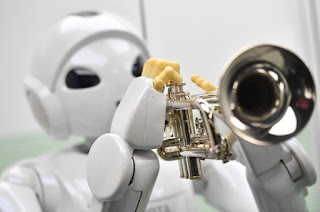Look at how Western popular culture sees robots, and it seems like people are pretty split on the issue of how to feel about them. Either they’re going to help us and lead to a utopian society where work is optional, or they’re going to kill us all over and over and over again. Then go back in time and try to kill us all before they killed us all the first time.
When you step out of popular culture, the conversation about robotics tends to shift more toward automation. Not, will Skynet eventually nuke us, but how long before ‘bots put us all out of work. This, too, tends to a fear-based relationship between humanity and robotics, even those who don’t have any artificial intelligence.
That fear is the basis for a new automation exhibit created by Ben Russell, which recently opened at London’s Science Museum, and is being shared online as well. The premise of the exhibit is to trace the history of “robots” from the very beginning of automatons to the modern smart machines that make 21st Century technology possible.
Russell’s exhibit gets pretty primitive, arguing that robots in one form or another have been with us for centuries. Clockwork statues are not generally considered robots unless you count scary children’s fables from the Hansel and Gretel days, but, for Russell, they certainly count.
Pop culture plays a big part in the exhibit, which includes the Terminator and examples of the 1950s sci-fi craze. And, just to be consistent with the initial premise of “real life” terror machines, there are several examples of automation machines that do jobs humans used to do.
Randall told the Associated Press people need to take the “long view” with regard to robots: “We have … 500 years of robots, robots haven't been these terrifying things, they've been magical, fascinating, useful, and they generally tend to do what we want them to do…”
Taking that view, according to Russell, we find that robots tend to be reflections of humanity, both morality tales, and tools to accomplish things we no longer want to do for ourselves. They are further evolutions of humanity’s ability to achieve and dream and wonder and create.
That’s not to say everyone takes that view. Currently, here in the United States, the fight is just ramping up between auto workers and the automated equipment expected to take many factory line jobs. And Order Here kiosks in fast food restaurants and grocery stores are always brought up when people argue about minimum wage.
The takeaway? When most people think about robots, they consider them in a specific context. Not within their potential, but based on how they will benefit or hurt humanity. They are tools … that could be weapons … and may just ‘wake up’ and try to take over.
William Doonan is a tax law and legal expert in New York.

No comments:
Post a Comment